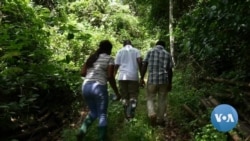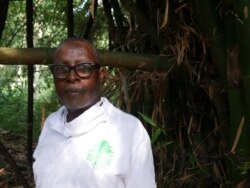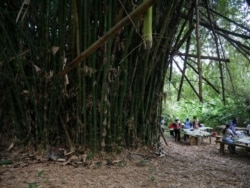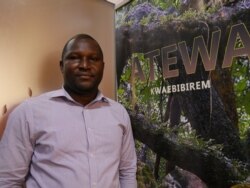A World Bank report shows Ghana loses at least 315,000 hectares of its forest each year. To help change that, a Ghanaian project is promoting sustainable forestry, teaching people the economic benefits of letting trees stand and surrounding vegetation live.
Wellington Baiden calls his lush, 85-hectare forest a “green supermarket” -- it produces fish, wood products, seedlings, fruits, and essential oils.
Baiden grows a range of trees, some fast-growing, many indigenous and endangered trees - as well as aromatic plants that produce natural oils used in perfumes.
While forestry is usually a long-term project, where the income comes with the harvest, Portal Forest Estates generates income both in the short and long term. Baiden is starting to harvest the trees he planted 20 years ago, but he’s replacing them and creating other businesses within the forest to ensure its future and benefit to the surrounding communities -- which he says is the key to sustainability.
"Having a working forest is, I would say, a key component to restoring forest cover, because, one - it provides jobs for the community and the encroachment basically happens because people need to survive,” Baiden said.
One of Baiden’s products is natural oils. Baiden is working with local farmers to grow plants like ylang-ylang and citronella, whose oils he can sell on international markets.
Chemist Justice Crentsil spends his days distilling the plants to create the oils. He says he’s the only one from his graduating class in this line of work, which he believes will help Ghana’s future.
"The fact that you’re not really damaging the forest - you’re not cutting down trees - and the fact that we don’t use any fertilizer in the forest, everything comes from Mother Nature - that’s a bit mind-boggling,” Crentsil said.
He hopes this project will become a blueprint, to ensure other forests are spared degradation when people see the long-term financial benefits held within them.
Ninety miles away, campaigners have been battling to save a different forest from government mining plans. Daryl Bosu, from environmental non-governmental organization A Rocha Ghana, says the working forest idea is key to stopping tree loss in Ghana by showing people the benefits in the short, medium and long term of keeping forest cover.
He says business models like Baiden’s are imperative for the sustainable use of natural resources, and they can also encourage conservation and restoration.
“I think it’s a good inspiration for every entrepreneur, businessperson and all of that - so now forest management is not only the requisite mandate of government - but also of every individual because the opportunities to benefit are enormous,” said Bosu.
Baiden is also planning a bigger distillery and an eco-resort and learning center within the forest. He says the learning center will train farmers and educate visitors about the forest project.
He wants it to inspire people to see the benefits in sustainable forests, creating what he calls “wealth in perpetuity.”












